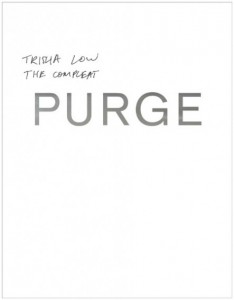A Review of Vulnerability on Trisha Low’s The Compleat Purge
 The Compleat Purge
The Compleat Purge
by Trisha Low
Kenning Editions, 2013
240 pages / $15.95 Buy from Kenning Editions or Amazon
I listen to NPR’s Morning Edition on Verdi’s 200th birthday. Soprano Sondra Radvanovsky says she loves Verdi’s operas: “People can relate, and say ‘Wow! I’m not the only person who fell in love with the wrong person,’ or ‘Oh gosh, I’m not the only person who made the wrong choice.’ Verdi makes people realize it’s OK to be human.”
This “realization” is the purge. Finger down the throat, razor from the drawer, opera on the stage. Purge. It’s OK to be human.
Trisha Low’s The Compleat Purge: a purge in three acts.
*
Act I: Low writes her last will and testament, turns a legal formality candid, into “gushy epistolaries” at age 6, then 13, 15, 17, 19, 20, 21, 23, 24. Suicide notes to her parents, to first loves, old friends, new friends, apologizing, professing undying love, willing Hitchcock DVDs, quoting from Murakami and Batman.
Low’s suicide notes are not gateways to reading her work, they’re the work itself. She’s keenly aware of Plath, Sexton, and Woolf. With Low brushing off the coup de grâce, the letters refuse ‘authentic’ truth.
Vulnerability as “elaborate conceptual joke.”
In an interview, Low quotes Joseph Kaplan: “I am interested only in the successful, annihilative manifestation of the poem, as an absolute violence.”
In John Cassavetes’ film Faces, characters pulse through impromptu sing-a-longs, threats, slaps, insults, a buzz of reverie and devastation. Overcome after cheating on her husband with the young playboy Chet, Maria downs a handful of sleeping pills. Chet finds her on the floor, tosses her in the shower, sticks his fingers down her throat, anything to wake her up, slaps her until she cries herself awake. Moment of calm. Chet lights a cigarette for her, leans back on the bed. “Nobody cares. Nobody has the time to be vulnerable to each other.”
Vulnerability as violence.
July 14th, 2014 / 10:00 am
Felix Bernstein’s Response to Vanessa Place, Slavoj Žižek, Trisha Low, and more
Beyond Vampires and Zombies
An Essay by Felix Bernstein
Vanessa Place’s latest manifesto “Zombie Poetry”[1] accurately frames her modus operandi: to glorify (and sanitize) Freud’s death drive (in which, doomed to never get what you want, satisfactory pleasure becomes impossible), over and against eros (the principle of maximizing pleasure). She provides a didactic demonstration of the death drive by casting herself in the role of Thanatos, a self-proclaimed undead zombie, feeding off (appropriating) the naïve pleasure of those feebleminded creatures who attempt to maximize pleasure, lecturing us that our notion of satisfaction and of mastery is a lie. Place is largely influenced by the famous schtick of Lacanian philosopher Slavoj Zizek, who is a master of belittling the part of us that believes we will find fulfilling objects. His refrain, like the song, is you can’t get what you want but you can get what you need, with this kicker: what you need is an unpleasant excess in the object of your desire that serves as a reminder/remainder of that which is denied in sexual relationships. This unpleasant excess, so-named “the kernel of the real,” can be found as the remainder of fantasies and mathematical equations To extract this rem(a)inder, you must read between the lines of speech, strictly under the Lacanian rubric. Then you will always find this same truth: the split subject, barred from accessing its full desire; in other words, the truth is the failure of desire. And this truth will always be delivered, for it is universally applicable.
For Place, those ‘poets’ who have not taken the conceptual turn that she prescribes, are in the thrall of a silly fantasy that our words might matter before they are decoded, analyzed, or appropriated by a master-analyst. [2]. This is her charge against those poets who have not sufficiently removed themselves from the craft of voicing desire. But also, more troubling, the voices that Place appropriates (the dumb college jokes, the early feminist dogmas, the victim’s testimony) all are framed as being (in their original utterances) naively unaware of the critical discourse into which she is happy to drag them. Those who take on the ‘voices of others,’ be they infused by the traditions of Language or Flarf or New York School poetics [or romanticism or camp or punk] will for Place indulge in an ideological fantasy that does not properly recognize or critique itself. But we all indulge a bit now and then, don’t we? And so it is only human (in the ‘living breathing’ sense) that now, in “Zombie Poetry” when the prospect of Place herself losing relevance enters the scene, that she can finally ask us to be concerned about the personal, the tragic, and the autobiographical, at the expense of the comic and universal. Now, she begs, we ought to look at her particular case, her particular deadpan style, her “I’m melting” bathos, and feel for her! That is, we ought to feel for the woman who is unfeeling.
Indeed, those who do feel for Place now, those who do still recognize her as a mother to their art, but refuse to follow her dogmatically, even those followers, she ridicules for being stupid enough to ‘pay her’ to fulfill this role. By her own calculations, it is inconsequential whether or not one ‘likes’ Vanessa Place, for ‘liking’ is merely a dumb, naïve, response, suitable for social media. It only matters whether or not one is driven to her. And she will, indeed, find that many will be driven her way. And driven by a death drive that is, unlike the one late Freud describes, vaguely pleasant. That is because it is nothing other than a performance of death drive, in the skilled manner of Place or Zizek, it is intelligible, hip, ironic, and stripped of any great dangers. It is in fact more optimistic, gung-ho, communal, and ego-affirming than those arts that indulge openly in true eros. It does not threaten civilization or even make us better understand its discontents. Rather, such performance of thanatos smoothly valorizes what might otherwise have been disruptive, if it were rendered with aesthetic brilliance instead of uncompromising didactic un-deadness.
The vampiric persona has long been iconic of positive, sympathetic, communal identification with the death drive. This identification goes beyond “Garbo is the best” because it is also ” “Garbo’s coldness is our coldness.” Even when nakedly announced in Freudian terms, the death drive is often used as communally binding tool; for example, Lee Edelman’s No Future: Queer Theory and the Death Drive, a revered book in the literary academy (not to mention in the cults around Freud, Zizek, and Lacan). The art world and the pop world, epitomized by Warhol or Lady Gaga, respectively, has found numerous ways to cash in on such glamorous thanatos; but too often the result is art that has zero stakes in its self-conscious display of determinately empty signifiers. Such vampiric signifying feeds on the flesh of signifiers, styles, and dialects that remains alive for those “others” from whom they are appropriated. The vampire thrives via the necrotizing of living symbols for the purpose of galvanizing cash and social mobility. This is why Claire Bishop can praise ‘dark, critical, negativity’ in art (and find Conceptual Poetry to be perfectly negative), all the while, attempting unabashedly to usher these ‘negative’ new forms of art in to the halls of high commodities, with her critical stamp of approval writ large. Of course, such ‘negativity,’ as Zizek or Place or Gaga or Warhol offers, is only as ‘negative’ as it is completely intelligible to art audiences, and it will be forever intelligible because it has no ambivalence about using the signifier, ruthlessly, to prove its point (which is, after all, nothing more than to show that the empty signifier trumps what is conservatively viewed to be an authentic display of desire). But maybe the simplest example to look to, for now, is Twilight, where young Bella, ambivalent about how to register affect, ends up choosing the learned, urbane, death drive of the vampires over and against the dumb, rural, pleasure principle of the werewolves. Which one would you pick? It must be hard being a young post-feminist!

